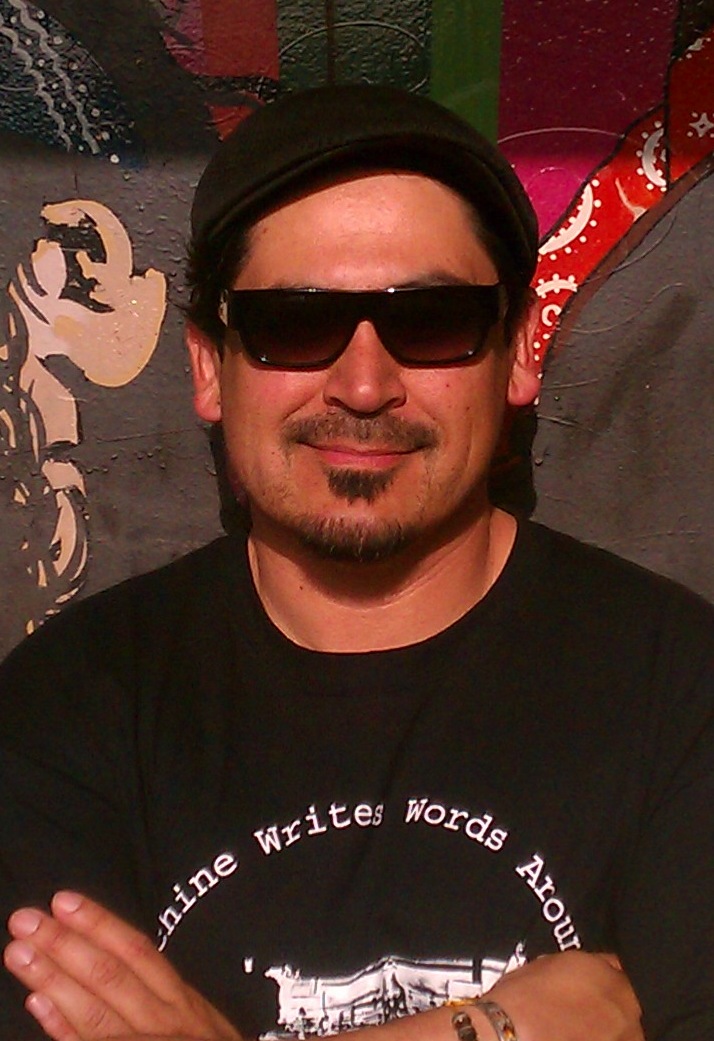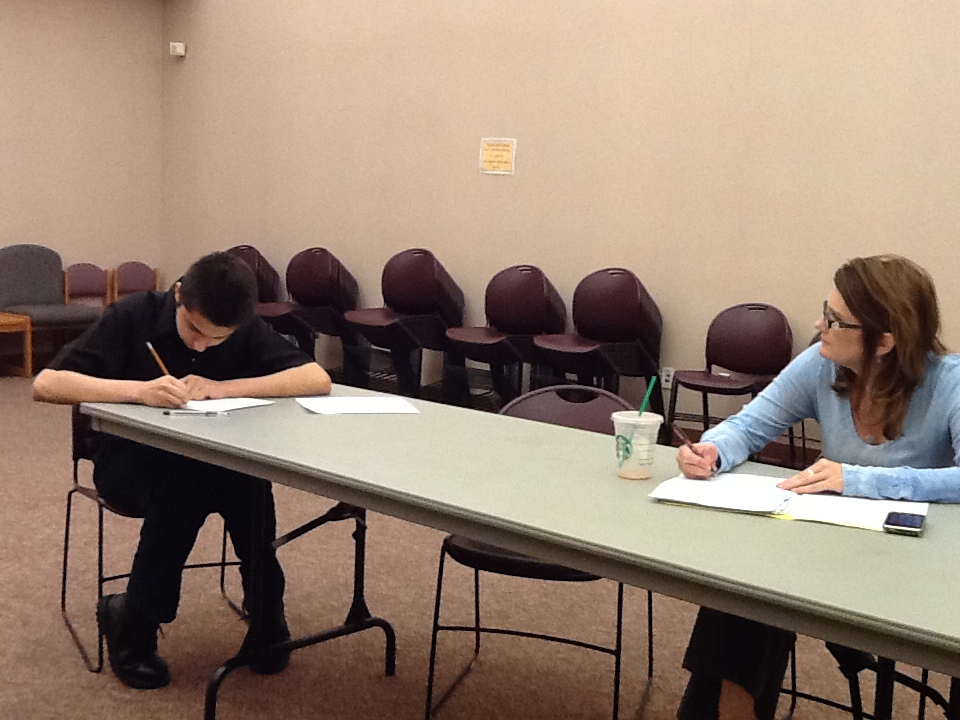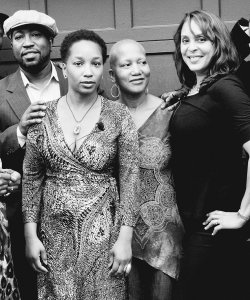Poet and fiction writer Tim Z. Hernandez blogs about two workshops he led on May 2 at libraries in Stockton, California, as part of a Rural Library Tour partnership between Poets & Writers and the California Center for the Book.
 The Maya Angelou Library on Stockton’s southeast side sits near a tired slab of old homes and pothole-ridden streets, but this is where my next workshop is, and I’m excited for it. By now I’ve learned that behind each workshop door are people whose stories and voices will stay with me for days, sometimes months after. Suzy Daveluy, librarian and my host, conveys her worry about the number of people in attendance. Before I can reply we are approached by two teenage girls, their younger brother, and their mother. The girls introduce themselves as Emilia and Yvette. Their brother is Jesus, and their mother is Gloria.*
The Maya Angelou Library on Stockton’s southeast side sits near a tired slab of old homes and pothole-ridden streets, but this is where my next workshop is, and I’m excited for it. By now I’ve learned that behind each workshop door are people whose stories and voices will stay with me for days, sometimes months after. Suzy Daveluy, librarian and my host, conveys her worry about the number of people in attendance. Before I can reply we are approached by two teenage girls, their younger brother, and their mother. The girls introduce themselves as Emilia and Yvette. Their brother is Jesus, and their mother is Gloria.*
They are here for the workshop, but their faces look grim. Right off, the girls let me know that they have no interest in pursuing writing as a career. In short, their mother makes them attend such workshops because she wants them to grow up articulate, well spoken. Jesus says nothing. Gloria tells me, in Spanish, that she is from Mexico but has been in the U.S. for over twenty-two years. She says the only reason she maintains a strong accent is because she’s always been reluctant to learn English. And this is it. This is my workshop.
We sit down and jump into a hearty discussion about memory. The girls giddily recall moments from their time growing up together, and there’s lots of laughing, and even a few tears, shed mostly by Gloria. I have them write those memories down, at the very least, I say, to capture them forever. “If we don’t tell our own stories,” I say, “who will?” When it’s time to share their writing, the girls go first, and then their mother, and now I’m staring at fifteen-year-old Jesus.
Finally he lifts his paper in front of him and glances over the words, then sits up straight and begins to read the memory he wrote about his father:
...the seatbelt, with its zigzag patterns
in blue, the shiny buckle, with its shiny button,
ahh, that little worn out button,
the sun, against the worn out button,
ahh, the sun and the worn out blue
of a button...
 If I didn’t see him write those words out in front of me, I might have never believed he wrote it. His delivery is like a smooth Lenny Bruce, witty and sharp, confident. Suzy and I look at one another, and I know we’re thinking the same thing: We’ve found the future poet laureate of Stockton! Of California! Hell, of the United States!
If I didn’t see him write those words out in front of me, I might have never believed he wrote it. His delivery is like a smooth Lenny Bruce, witty and sharp, confident. Suzy and I look at one another, and I know we’re thinking the same thing: We’ve found the future poet laureate of Stockton! Of California! Hell, of the United States!
“You’re a natural poet,” I tell him.
He lowers his eyes.
His mother feels the need to explain. “Jesus was picked on when he was in elementary school,” she says. Jesus rolls his eyes. “He had a bad teacher who put his English down in front of the other students, so he thought he was dumb. He used to come home saying he was dumb."
Jesus says, “Read and red.”
“What’s that?” I ask.
“Read and red,” he replies. “It was read and red. I didn’t understand the difference, so I always got those two words mixed up, and I always spelled them wrong.”
I tell him spelling doesn’t matter. I think of what the poet Maria Melendez says from the moment she enters a clasroom of children: YOU ARE THE BOSS OF YOUR OWN POETRY! And I can’t tell you how many times I’ve seen adults steal away this possibility from children.
I tell them about California’s newest poet laureate, Juan Felipe Herrera—the son of migrant farmworkers, selected by Governor Jerry Brown himself. And then I recite a line from one of Herrera’s poems: I didn’t start out as a poet, because I was silenced. I started out with something I wanted to say. Jesus smiles now, and so does his mother.
“You see,” she tells him in Spanish, “One day you could be a famous poet too!”
He grins and looks over at his sisters. “That would be cool,” he says, folding his poem and sticking it into his back pocket.
*Family members’ names have been changed.
Top photo: Tim Z. Hernandez. Credit: David Herrera. Bottom photo: Jesus (left) and librarian Suzy Daveluy. Credit: Tim Z. Hernandez.
Major support for Readings/Workshops in California is provided by The James Irvine Foundation. Additional support comes from the Friends of Poets & Writers.







 The Maya Angelou Library on Stockton’s southeast side sits near a tired slab of old homes and pothole-ridden streets, but this is where my next workshop is, and I’m excited for it. By now I’ve learned that behind each workshop door are people whose stories and voices will stay with me for days, sometimes months after. Suzy Daveluy, librarian and my host, conveys her worry about the number of people in attendance. Before I can reply we are approached by two teenage girls, their younger brother, and their mother. The girls introduce themselves as Emilia and Yvette. Their brother is Jesus, and their mother is Gloria.*
The Maya Angelou Library on Stockton’s southeast side sits near a tired slab of old homes and pothole-ridden streets, but this is where my next workshop is, and I’m excited for it. By now I’ve learned that behind each workshop door are people whose stories and voices will stay with me for days, sometimes months after. Suzy Daveluy, librarian and my host, conveys her worry about the number of people in attendance. Before I can reply we are approached by two teenage girls, their younger brother, and their mother. The girls introduce themselves as Emilia and Yvette. Their brother is Jesus, and their mother is Gloria.*  If I didn’t see him write those words out in front of me, I might have never believed he wrote it. His delivery is like a smooth Lenny Bruce, witty and sharp, confident. Suzy and I look at one another, and I know we’re thinking the same thing: We’ve found the future poet laureate of Stockton! Of California! Hell, of the United States!
If I didn’t see him write those words out in front of me, I might have never believed he wrote it. His delivery is like a smooth Lenny Bruce, witty and sharp, confident. Suzy and I look at one another, and I know we’re thinking the same thing: We’ve found the future poet laureate of Stockton! Of California! Hell, of the United States!